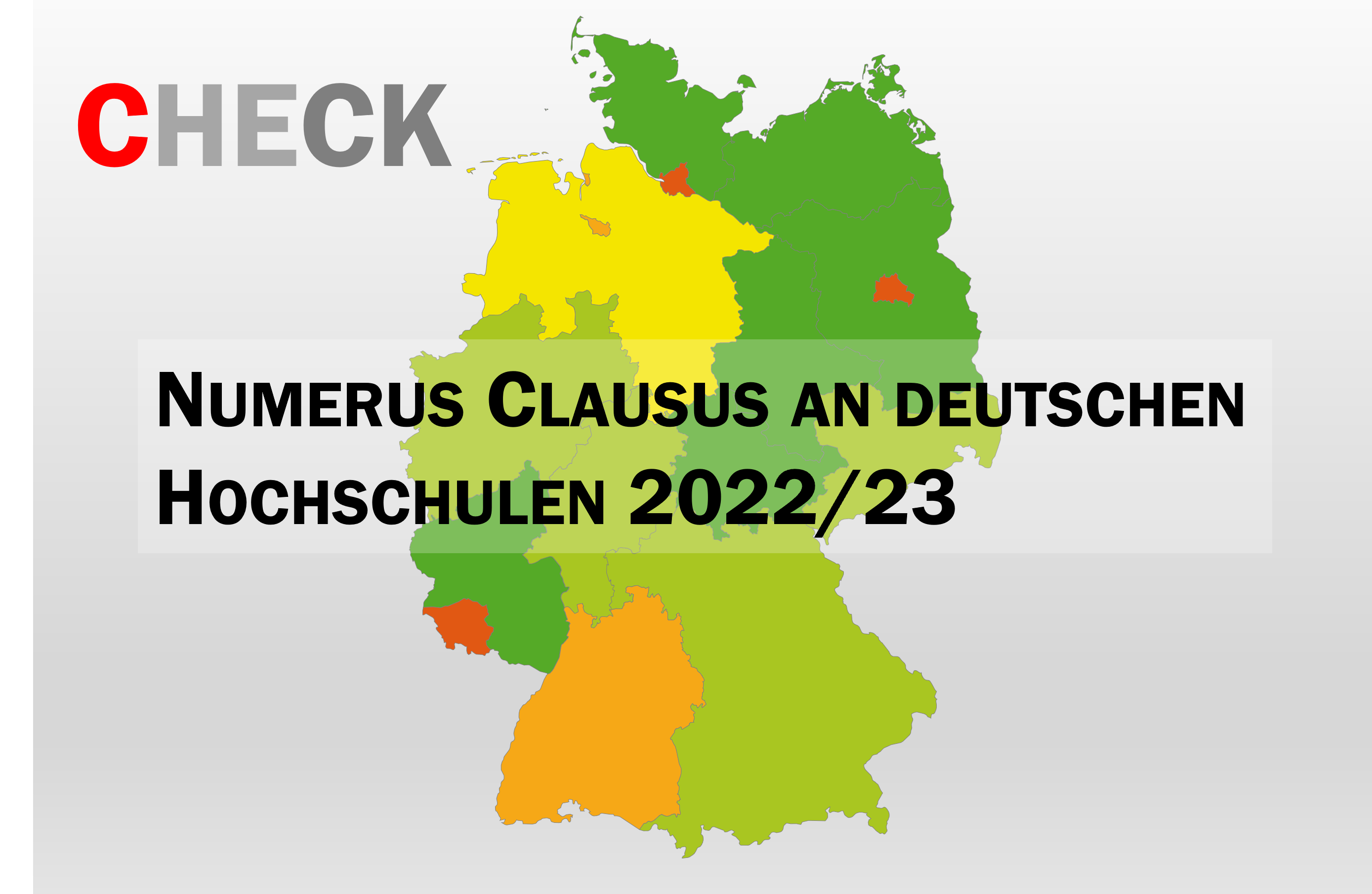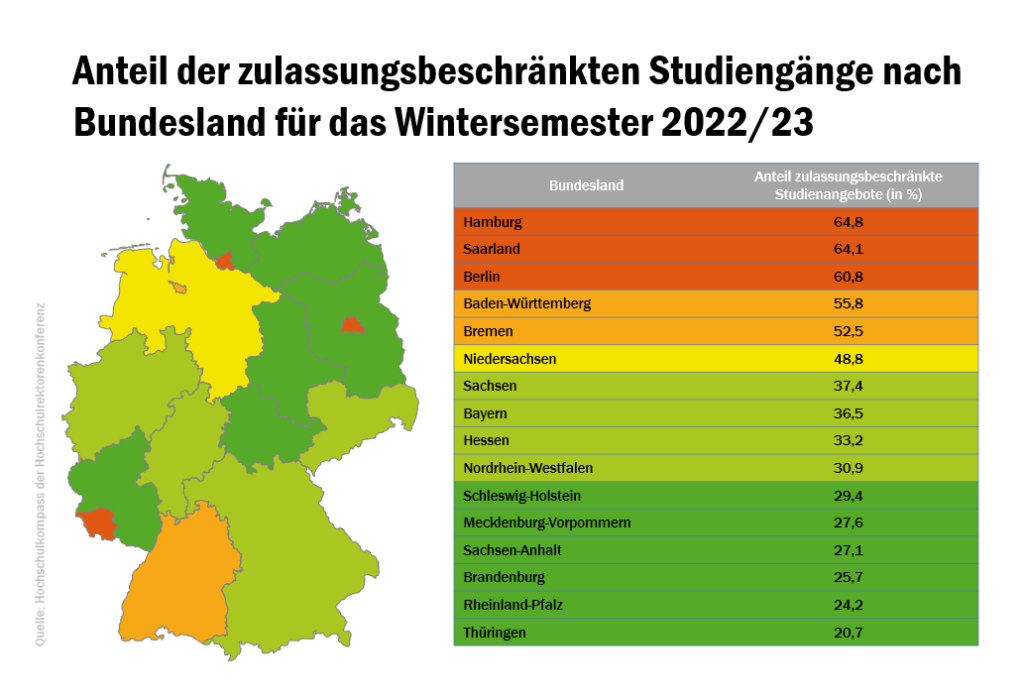
Many school-leavers will shortly be receiving their Abitur certificates. They will then be free to choose from the majority of study programmes offered in Germany without having to undergo a selection process. Less than 40 per cent of all study options offered at higher education institutions (HEIs) in Germany next winter semester are subject to admission restrictions (referred to as Numerus Clausus, or NC). In Thuringia and Rhineland-Palatinate, in fact, less than a quarter of all available programmes are subject to restricted admission. Hamburg, Saarland and Berlin have the highest proportions of restricted-entry programmes. These are the results of the annual Numerus Clausus CHECK conducted by the CHE Centre for Higher Education.
In Hamburg, Saarland and Berlin, two out of three study programmes are subject to restricted admission next winter semester 2022/23. This means that there is a maximum number of students that can be admitted to those programmes. Prospective students must then apply for a place and cannot simply enrol. Places are then allocated based on a number of criteria, including Abitur examination grades. Although Hamburg was able to reduce its proportion of NC subjects slightly compared to the previous year, it is again the federal state with the highest proportion in Germany (64.8 per cent). Next come Saarland (64.1 per cent) and Berlin (60.8 per cent).
Would-be students in Brandenburg, Rhineland-Palatinate and Thuringia have the best chances of securing a place at university. In Thuringia, for example, around four out of five study programmes are with non-restricted admission, i.e. they are open to all interested people with a university entrance qualification, such as Abitur. The proportion of NC subjects throughout Germany has fallen again, and currently stands at 39.7 per cent.

[The graphic shows the proportion of degree programmes with admission restrictions by federal state for winter semester 2022/23]
“After the last two challenging years, it is good news for prospective students from the current cohort of school-leavers that more than half of all study programmes are open to them without any restrictions,” stated CHE Executive Director Frank Ziegele, commenting on the results. “The fact that the proportion of NC subjects for Bachelor’s programmes has fallen by more than 11 percentage points since 2013, in spite of persistently high student numbers, reflects careful planning on the part of HEIs and policymakers,” noted Ziegele.
Substantial differences can still be seen between cities. Prospective students applying for a place in a university city with a student population of 60,000+ have the best chances in Aachen, where around 25 per cent of study programmes are subject to restricted entry, according to the analysis conducted by CHE this year. Saarbrücken (64 per cent) and Leipzig (61 per cent) had the highest proportions of NC subjects among all university cities with more than 17,000 students.
“If your chosen degree programme happens to be subject to restricted admission at your favourite university, it is always worth looking at alternative HEIs,” advised Cort-Denis Hachmeister. In many cases, there are comparable study options available without NC restrictions, stated CHE’s expert in access to higher education. “Apart from the few university subjects with nationwide admission restrictions, such as medicine, dentistry, veterinary medicine, pharmacy and psychology, there is almost always an alternative programme without selective entry at a state university,” Hachmeister added.
The proportion of programmes with restricted admission also varies considerably depending on the subject, the type of higher education institution, and the type of degree: nationwide, about one in two degree programmes in the fields of law, economics, social sciences and humanities are subject to restricted entry. In contrast, first-year students are free to enrol on around two-thirds of engineering programmes, regardless of their Abitur grades.
The percentage of degree programmes subject to restricted admission at universities (36.9 per cent) continues to be lower than that at universities of applied sciences (41.3 per cent). The proportion of NC subjects is slightly higher for Bachelor’s programmes (40.0 per cent) than for Master’s programmes (39.5 per cent).
About the publication:
The “CHECK – Numerus Clausus an deutschen Hochschulen 2022/23” (Numerus Clausus CHECK at German higher education institutions 2022/23) is based on NC data contained in the Higher Education Compass of the German Rectors’ Conference for around 21,300 study programmes in winter semester 2022/23, as well as relevant data from previous years. Percentages for the federal states were determined with reference to the location of the main site of the university. In the case of location-specific NC figures, all study programmes offered at the study location are counted. This means that, in the case of city-states, there may be minor deviations between the percentage in the federal state and that in the city. The federal state, the type of higher education institution, the type of degree and the group of subjects were used as criteria for the analysis conducted by the team of authors comprising Anna Gehlke, Cort-Denis Hachmeister and Lukasz Hill. All graphics contained in the CHECK are freely available to interested readers in the CHE Flickr cloud.
Interactive graphics related to the publication – link
